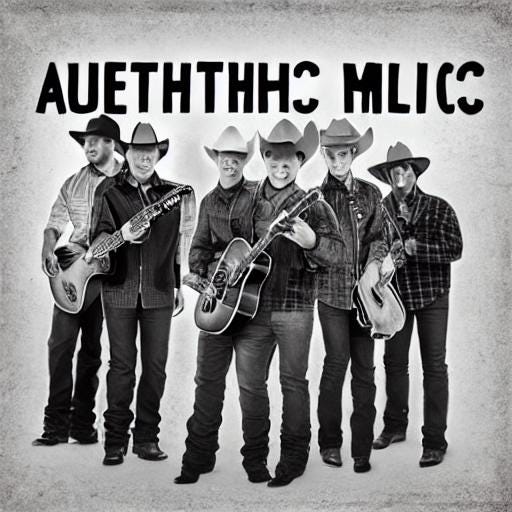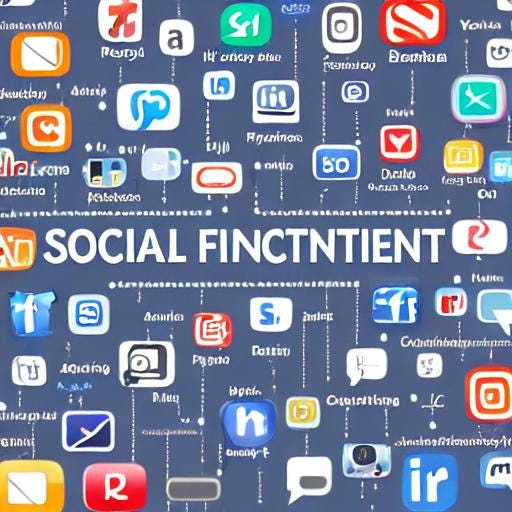Authenticity is a construct
find out what happens when people stop being polite and start getting real
Last week, I wrote a little about the history of the internet to provide a bit of a foundation about some of the other topics I want to dig into here. Then one of my dear friends who is also a sociologist (hi Tiffany!) commented this:
The Goffman angle is so interesting! When people are posting their “backstage” online, can we even really call it a backstage anymore? It’s like a presentation of our backstage, a presentation of what we want people to see or think our backstage is like, but doesn’t that then become a presentation of self? It’s the front stage posing as the backstage?
I love having smart friends.
There aren’t many things (besides Tiffany) that I remember fondly from my time as a sociology PhD student, but there are a few. A few courses I TA’d for, a summer course I taught, watching the rare lightbulb go on in a student’s head when they fully understood what you were teaching them. There are also a select few books and learnings that I treasure, such as the Goffman I wrote about last week. But there’s another book, one of the few sociology books I still, to this day, recommend to others, and it goes well with this Goffman-esque topic we’re on here. The book is called Creating Country Music: Fabricating Authenticity, by Richard A. Peterson. I love this book. It’s a delight – enjoyable to read, super informative, a rare academic work that never lapses into the dreaded “academese.”
I’m a little annoyed at myself that I’ve chosen this moment to loop this book into my newsletter, because I’m away visiting my parents and the book isn’t on the shelf near me. But that’s ok, I can dive in more later if I want, and really I’m not going to write about the book, just recommend it and nod to it in this moment. Really I’m bringing it up because:
I bring it up every chance I get, I love it that much, and you should read it, even if you don’t give a fig about country music and
Peterson shows that what we now think of as “authentic” when we think of country music was largely a set of intentionally manufactured images and sounds. In fact, the very word “country” was chosen to describe the genre when it was in need of an appropriate label. 1
In fact, in a great little synopsis of the book, Peterson writes:
Authenticity in performance has a completely different meaning than authenticity with reference to objects. Authenticating a document or work of art involves finding whether it is the original object. However, if you are an authentic performer, let's say, and I copy your look, lyric, or style, I am to that degree imitating and not authentic. Thus what is taken to be authentic is continually changing.
This is something I’ve thought about a lot over the years, particularly in recent times when I was at IG, but throughout my entire time working in tech. What does it even mean to be authentic? What is your authentic self? And – as Tiffany’s comment highlights – how has the proliferation of social media contributed to the continual change of what it means to be authentic, given social media’s inherently performative nature and its steadily increasing focus away from “shared passions and interests” toward “you, the individual, just you, you’re alone in the spotlight”?
Whew, that was a mouthful.
A quick caveat. Authenticity is a complicated topic (duh obviously), and it’s complicated in ways that I need to acknowledge: I cannot speak for everyone’s experience with authenticity. In some ways, authenticity is a spectrum, or maybe there are gradations of authenticity. For some, like people of color who have talked to me about working/living/being in all-white spaces, there are experiences in which it’s possible to truly be a more authentic self, without the need to hide parts of themselves or code switch or behave in such a way as to blend in more effectively. So I don’t want to come across like I’m saying all authenticity is false or made up. I think there’s a big difference between personal experiences of authenticity – or, as Tiffany rightly highlights, the “true backstage” that Goffman wrote about – and the authenticity of culture and cultural production, as well as the idea of authenticity on social media.
Now, for those of you who use IG, what I am about to say will not be surprising or controversial (nor is it a company secret). Many, many things have been written about this: Of all the social media apps, IG is viewed as the one with the most polished content. It’s your highlight reel, your Best Of. Very few things are grid-worthy, and people even worry about putting polished content in Stories. Everyone’s feeds are full of influencers and celebrities and brands.
One of the things we heard a lot when I was at IG was that users, and especially teens, wanted things that felt more authentic. In one way, they wanted true personal authenticity: They felt so much pressure in so many areas of their lives, and social media had made that pressure worse.
Something you might not think about as much as I think about is how social media is essentially the world’s social infrastructure, but it’s been built in much the same way as infrastructure in general: Haphazardly and by chance at first, then occasionally with intent and care but mostly with with a focus on the twin interests of industry and money. Like how US cities differ not just by age but by the industry they developed around (e.g., NYC : finance :: Detroit : manufacturing :: LA : Hollywood) and by the industries or people that wielded significant power (like the automobile lobby or Robert Moses). Obviously this is something we need to talk about, but let’s put a pin in it for another missive.
Anyway, teens need social media to stay connected to their friends, the culture, the world. But just because they use social media doesn’t always mean they like it all the time, or even most of the time. One of the fundamental things you learn as a user researcher (aka a user experience researcher or UXR) is that people often do not understand the actual problem they’re having. It’s like my time as an advice columnist: Someone can write in with what they think is a problem, but the real problem is lurking somewhere between the lines, or a little deeper under the surface. I guess in a sense you can think of UXR a little bit like therapy, and if you do UXR really well, you can help solve a problem not only for one or two users but in a way that solves the problem they didn’t realize they were having, and in turn helps solve the problem for the app or product itself.
The trick is that often times people will tell you what they think they want as a solution, and it’s tempting to take that at face value. I don’t mean to say they’re wrong, or that they’re dumb and facile. Rather, they haven’t sat around trying to dig into the problem to fully understand it, and they will reach for the nearest proxy they think will provide a sufficient solution. So if the problem is “I feel too pressured to be polished and perfect,” the easy solution seems to be “I wish I had more authenticity.” And that will work for a while. Look at what powered a lot of TikTok’s success. Look at the sudden explosion of BeReal last year. People responded to the idea of being weirder, less polished, more spontaneous and in the moment – all things it’s easy to equate with authenticity.
Now let’s go back to Dr. Peterson and to Tiffany’s point. What is taken to be authentic is continually changing. In the age of social media, it’s changing at lightning speed. Whoever did the first “photo dump” on IG might have authentically wanted to share a more authentic experience, but then everyone copied it and it started to feel, well, sort of performative, right? Or like all the jokes about people panicking in the two-minute BeReal window to get themselves together and look as cool/good/”authentic” as possible. As the “authentic self” becomes something you also perform, there is very little backstage anymore in this giant social infrastructure we’ve created. So much is front stage. So much is a constant performance, with so little chance to take a break from performing, especially as people spend more time online and report being more isolated and having fewer friends and in-person social interactions. No wonder we’re all so exhausted!
The solution, of course, is to get to the root of the problem. It’s to figure out what people want and why, what they’re struggling with and how that matters, and then try to fix that, one small bit at a time. But let me tell you: It is challenging. Not just because you can never get it perfectly right. You can only ever come asymptotically closer over time. Also because, as much as a company will say they want to be user centric, when it comes time to make money, something always has to give.
I bet you can guess what.
See you next time!
Lxx
****
Three recommendations from me, if recommendations are your thing
Seriously, read the Richard A. Peterson book, even if you hate country music. It’s so good.
Two makeup recs in one:
Last summer my friend Sadie recommended the Olio e Osso balms to me, and I love them so much. They’re great for cheeks, especially when it’s hot and sweaty outside.
Many of you once referred to me as the lipstick whisperer, and I am here to say that VIOLETTE_FR’s Bisou Balm in Bétise is my holy grail.
If you need to walk down the street with a sexy strut, may I suggest listening to Chaka Khan’s Like Sugar?
See also: “From the late 1940s country had been a musical genre in search of a label—something less degrading than "hillbilly." Everything from "old-time" to "oat tunes" was tried out, but "folk" gained currency with the unexpected success of the Weavers, whose hits included "Goodnight Irene" and "On Top of Old Smoky." Even Hank Williams called himself a folk singer. Then came the 1952 Senate hearings, where McCarthy demanded that the Weavers' lead singer, Pete Seeger, testify about his "Communist leanings." The industry dropped "folk" like a hot rock and "country and western" or simply "country" came into wide use.”




This was a fun read, and not just for the obvious reason 🥰.
You ever think about this shit and how it all connects to the quantum world? In that world things can behave differently based on whether or not it is being observed. It’s like atoms and light care about their presentation of self 🙃
Just reading your post now. I think it can be both inauthentic to hold stuff in reserve, one's "backstage" if you will, AND authentic to do the very same thing. Depends on the demands of the moment and which response is truly representative of who you are and what you want. Authenticity is not one thing played out over and over. That's brand. Authenticity is fluidly responding to the moment in alignment with the self. Thanks for an interesting article.